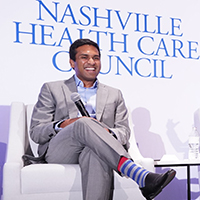The healthcare industry has been working toward a value-based care system for quite some time. What will it take to make it a reality — and make it stick? Here are a few suggestions from a recent Nashville Health Care Council panel featuring Change Healthcare President and CEO Neil de Crescenzo; J.P. Morgan Managing Director, Healthcare Investment Banking Nikul Patel; Ascension Saint Thomas, Chief Strategy Officer Fahad Tahir; and moderator Premise Health, CEO Stu Clark.
Employ nontraditional approaches.
Tahir encouraged attendees to look at problems from a social and societal perspective, then determine the healthcare provider’s role in the solution. “As we approach the problem, we want to develop a portfolio of services – a delivery system – that can tangibly and measurably create value on a total cost of care basis for the purchasers of healthcare: health plans, employers and ultimately the consumers,” Tahir said. “By creating that portfolio, we can provide more than great clinical programs in the traditional hospital and tertiary spaces, it also gives us the ability to create a really accessible and financially attractive cost point. We really believe narrow networks create that immediate measurable reward but there’s a lot more we can do to translate that for individuals and consumers.”
“There’s going to have to be a lot of creativity,” de Crescenzo agreed. “We just signed a 10-year agreement with Walmart to help them bring value-based care practices to the Walmart health network. 150 million Americans walk through a Walmart every week. When you think about having an impact on the U.S. health system, you can touch a lot of lives trying to do things at that scale.”
Empower providers with data, tools and time.
“Providers need access to more information, and for that information to be actionable and delivered in real-time. Data and analytics help identify gaps in care, determine which people need the most attention, and help establish optimal care pathways and protocols to care for them. What we have right now is a lot of different point solutions that aren’t connected – we don’t have a quarterback. If you empower the provider to be that quarterback and arm them with the right tools and real-time insights, he or she can use them to bring change to the population,” Patel said.
Patel also referenced the administrative burden that often prevents providers from operating at the top of their licenses. More robust care teams and technology can help absorb that burden and allow providers the capacity to care for additional patients.
Think outside the healthcare box.
Neil de Crescenzo reminded the group that the biggest driver of healthcare costs is chronic illness. “Lifestyle and behavior changes are widely recognized as the biggest contributors to continued illness or lack of improvement. If you think about which organizations have been the best at behavioral economics in the last 10 years, I believe you start with Amazon,” he said. “Amazon has very publicly said, ‘We tried to do this ourselves,’ and when it didn’t work, they shut it down and said, ‘We better do something different.’ I give them a lot of credit. Think about a company the size of Amazon and all the expertise they have around innovation, but they declared failure. Then they bought a modestly sized primary care clinic network. It’s not easy, even with all that expertise.”
“Their humility should inspire ours. We can learn a lot from organizations outside healthcare about respecting the voice of the consumer, using behavioral economics to coach people to make good decisions for their health, and building business models around that,” Tahir added. “We’re part of an ecosystem. We can’t do that in isolation as we’ve traditionally done in healthcare, and hopefully a lot of nontraditional partnerships will come out of this phase of the industry. ”
Get insights like this and more by joining the Council’s upcoming in-person and virtual events. On November 2, the Council will host “Health Care Brass Tacks,” featuring Aegis Sciences Corporation CEO Dr. Frank Basile. Register for the event at this link or visit healthcarecouncil.com/all-events to view the full schedule of upcoming programs.
